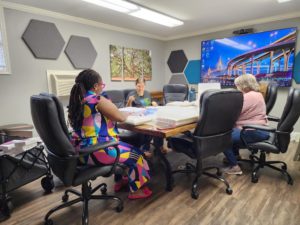Source: Chaunte’ Causey, Communications Manager, Palmetto Care Connections
On December 18, 2024, the Palmetto Connect Team took a step forward in its mission to bridge the digital divide and health equity. We partnered with the Department of Health and Human Services in South Carolina for a Digital Literacy project to improve access to healthcare for a targeted Medicaid population.
Thanks to a grant, we were able to send 24 internet-capable tablets to residents in Florence and Horry counties. These tablets will allow these residents to access their healthcare providers from the comfort of their own homes.
To meet the needs of this population, Palmetto Care Connection created online modules to help this population enhance their digital skills. The modules cover topics such as device basics, email usage, internet navigation, cybersecurity, telehealth, and health literacy. After completing all their modules, participants are encouraged to use their tablets independently, helping to build confidence and deepen their engagement with digital tools.
With this grant, we expanded our Digital Inclusion outreach to over 30 counties in South Carolina. This success reflects the dedication of the Palmetto Connect Team and underscores the importance of providing equitable access to technology and education for Medicaid beneficiaries. By enhancing digital literacy, the initiative improves participants’ ability to engage with health and telehealth resources and promotes broader access to digital opportunities in their daily lives.
We are thankful for the support of the Department of Health and Human Services which allows us to provide these services. This is just one way the PCC is tackling healthcare equity in South Carolina and nationwide.


 Palmetto Care Connections proudly celebrates Dr. Meera Narasimhan, a board member, for receiving the Dean’s Distinguished Career Achievement Award from the University of South Carolina School of Medicine Columbia.
Palmetto Care Connections proudly celebrates Dr. Meera Narasimhan, a board member, for receiving the Dean’s Distinguished Career Achievement Award from the University of South Carolina School of Medicine Columbia.
 The training provided detailed guidance on the do’s and don’ts when supporting clients, ensuring interactions remain both ethical and effective. Participants reviewed programs administered by agencies such as the Department of Social Services, Department of Health and Human Services, Welvista, Internal Revenue Service, and Social Security Administration.
The training provided detailed guidance on the do’s and don’ts when supporting clients, ensuring interactions remain both ethical and effective. Participants reviewed programs administered by agencies such as the Department of Social Services, Department of Health and Human Services, Welvista, Internal Revenue Service, and Social Security Administration.